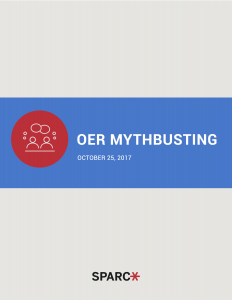Debunking the top myths about OER in North American higher education
While the movement for Open Educational Resources (OER) has grown exponentially across North American higher education institutions, some myths about OER still remain. Whether it is confusion over the meaning of open and related concepts such as free or digital, or adherence to folk wisdom such as “you get what you pay for,” there are many common misunderstandings about OER. Our hope is that it will provide a useful resource for both OER advocates and those seeking to learn more about the topic.
OER Mythbusting addresses the top seven myths about OER in North American higher education, as voted on my more than 100 faculty, librarians, students and other members of the OER community. This project grew out of a discussion during one of SPARC’s Libraries and OER Forum monthly calls, where a group of librarians from the U.S. and Canada identified a need for better resources to address misconceptions about OER.
While OER Mythbusting is not intended to be a comprehensive catalog of all myths in all contexts, our hope is that it will provide a useful resource for both OER advocates and those seeking to learn more about the topic. We anticipate that this resource will evolve over time, as new myths emerge and old ones fade.
Download OER Mythbusting:
- Formatted PDF
- Unformatted text (google doc)
